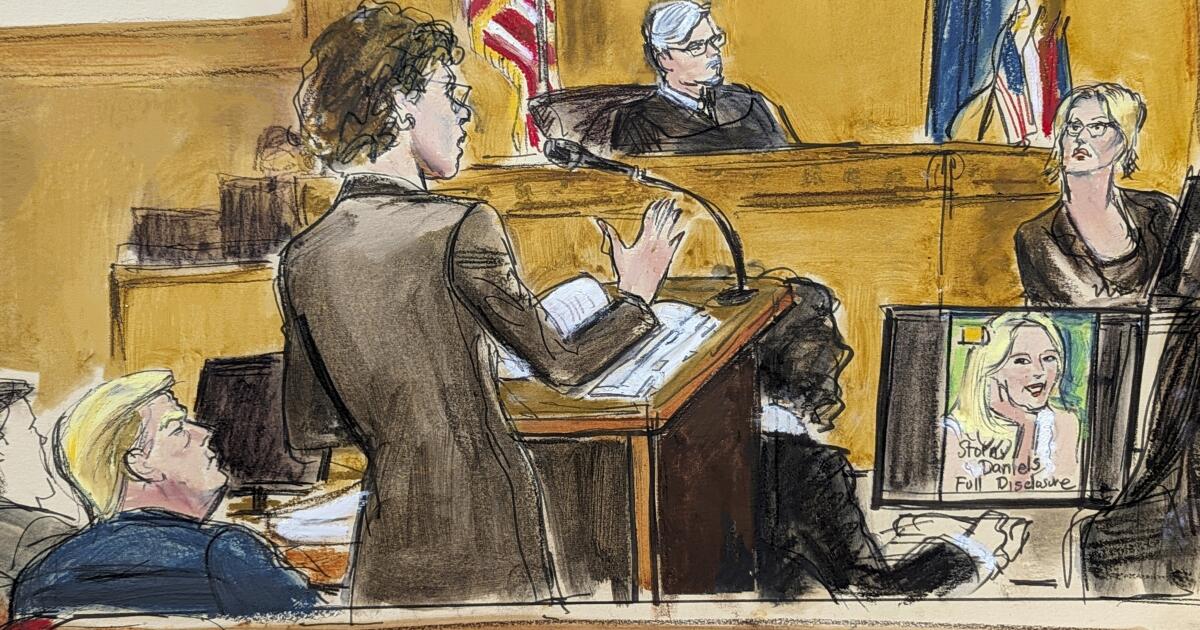The seven men and five women tasked with determining the former president’s guilt had been hearing from multiple vantage points about the woman whose allegation of a 2006 sexual encounter with Trump had triggered an existential crisis in his campaign. Daniels was the moving force behind the whole tawdry payout that purportedly necessitated the elaborate document doctoring that is the subject of the New York indictment.
So the jury took obvious notice and listened intently to her story. It’s at once a sort of classic American tale of a rise to success from hardscrabble beginnings and a, well, exotic narrative from a world that is presumably foreign to the jury, one of not only adult films but also celebrity golf tournaments, famous athletes and cavernous hotel suites.
Daniels’ presentation reflected these conflicting forces. She came across on the one hand as intelligent, wordly and proud of her accomplishments. But she also told of stumbling half-aware into sex with a powerful older man whom she found repulsive in many ways, leaving her confused and stupefied.
She also spoke very quickly, perhaps betraying nervousness, and her answers often wandered well outside what the questions called for. That more than once caused Judge Juan M. Merchan to respond with evident pique, at one point interjecting (and sustaining) his own objection. Like most good trial judges, Merchan seems to command respect from the jurors, so his remonstrations are likely to affect their view of the witness.
Merchan had attempted to establish guardrails to prevent testimony about essentially gratuitous details that are far afield from the criminal charges and could prejudice the jury against Trump. And sure enough, after the prosecutor’s direct examination of Daniels, the defense moved for a mistrial, citing her account of such icky particulars as Trump’s failure to wear a condom.
Even more than the prurient particulars, Daniels’ testimony posed a problem by suggesting her alleged encounter with Trump was in some sense coercive. Although she testified repeatedly that she was not forced to have sex with the defendant, she also noted his greater physical size, the unbalanced power dynamic between them and her care to keep their subsequent encounters public.
Merchan denied the motion for a mistrial while noting that Daniels was in some ways a difficult witness to control. You can be sure that the issue will come up on appeal should Trump be convicted.
At the same time, Daniels’ cross-examination by Trump lawyer Susan Necheles had its own problems and may have increased the jury’s sympathy for the witness. Necheles continually accused Daniels of being a liar and a gold digger. The questions occasionally got a rise out of Daniels, but more frequently she swatted them away with a flat “false” or “no.” That, along with frequent sidebars between the judge and attorneys, disrupted the rhythm of the exchange, which lacked the crisp control and momentum of an effective cross-examination.
Daniels’ testimony therefore holds potential risks and rewards for both parties, and it’s not easy to calculate how it will play on balance.
From the vantage point of the prosecution, the legal essentials of the hush money payment and alleged fabrication of documents don’t turn on whether the jury believes Daniels. Indeed, a number of analysts suggested the district attorney would have been better off not calling her at all.
What that analysis overlooks, however, is the jury’s natural desire to take the measure of the woman who propelled the crisis and about whom they had heard so much. Not calling her risked leaving them wondering what the prosecution was hiding.
On the other hand, if a good portion of the jury didn’t like Daniels or, worse, didn’t believe her, that could negatively influence their deliberations.
From Trump’s vantage point, the risks are keener. That is in large part because his vanity and arrogance have forced his lawyers to commit to an unnecessary insistence that he never had sex with Daniels. Consequently, if the jury credits the basics of her story, it discredits Trump.
And it’s very hard to see how the jury could adopt Trump’s absolutist account, including his claim that he met Daniels only once at a celebrity golf tournament. For starters, the evidence that they met several times thereafter is basically undisputed.
The next trial day, Thursday, will begin with the balance of the cross-examination followed by the government’s redirect. Both sides will have studied the transcripts and adjusted their approaches. Yet it’s likely that the 12 most important people in the courtroom have formed their fundamental impressions of the witness. More than with any other witness in this trial to date, the nature and import of those impressions are unpredictable.
That being said, her overall story was credible and, moreover, corroborated by other witnesses in most if not all of its important details. Having watched the jury carefully from my seat in the courtroom Tuesday, I think Daniels did what she needed to do.
Harry Litman is the host of the “Talking Feds” podcast and the Talking San Diego speaker series. @harrylitman
